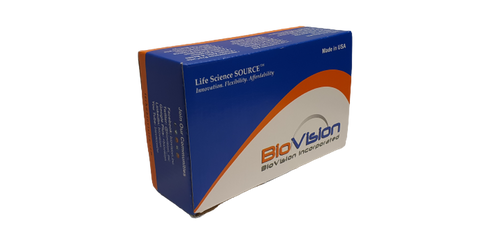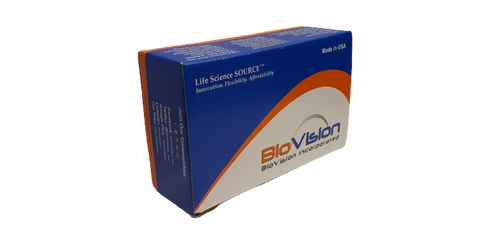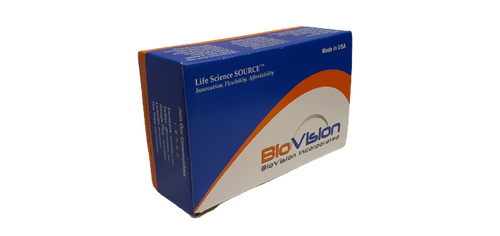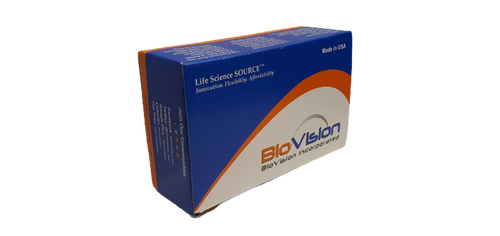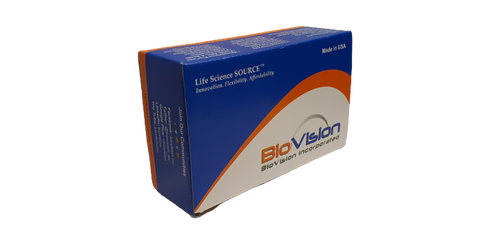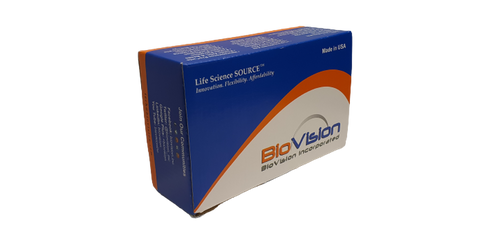Product Description
Biovision | K2029 | 1,5-Anhydroglucitol Assay Kit (Colorimetric) DataSheet
1,5-Anhydroglucitol (1,5-AG) is a metabolically inactive deoxy analogue of glucose that is present in most grains and meats. It is well absorbed in the intestine from dietary sources and is readily reabsorbed by the Na+-dependent glucose symporter (SGLT4) in renal proximal tubules. A small amount of 1,5-AG (proportional to dietary intake) is released in the urine, resulting in a constant steady-state concentration in blood and most tissues (variable depending on diet). However, in hyperglycemia (plasma glucose above 180 mg/dl), glucose saturates SGLT4, thereby preventing 1,5-AG reuptake and dramatically increasing the urinary excretion of 1,5-AG. Measurement of plasma or saliva 1,5-AG levels can identify recent (within the last 10-14 days) hyperglycemic episodes (even if glucose levels appear normal at the time of measurement) and reflects the mean blood glucose level over the previous 1-2 weeks in diabetic patients. BioVision’s 1,5-Anhydroglucitol Assay Kit is a high-throughput adaptable microplate-based assay that enables rapid quantification of 1,5-AG levels in biological fluids. The assay consists of two steps: in the first step, the sample is pretreated to remove endogenous glucose that may interfere with the 1,5-AG detection and 1,5-AG is converted to 1,5-AG-6-phosphate. In the second step, 1,5-AG-6-phosphate is enzymatically metabolized, generating NADPH, which subsequently reacts with a colorless probe to form a strongly colored product measured by absorbance at OD = 460 nm. The absorbance is proportional to the concentration of 1,5-AG present in the samples. The assay is not affected by galactose, fructose or other physiologically common sugars and has a limit of detection of 0.11 nmoles of 1,5-AG per well, with a reliable linear range from 0.2 – 5 nmole per well (corresponding to a 20-500 μM concentration in a 10 μl sample volume).
Alternate Name : 1,5-Anhydroglucitol Assay Kit (Colorimetric)
Tag Line : For rapid quantification of 1,5-AG levels
Summary : 1,5-Anhydroglucitol (1,5-AG) is a metabolically inactive deoxy analogue of glucose that is present in most grains and meats. It is well absorbed in the intestine from dietary sources and is readily reabsorbed by the Na+-dependent glucose symporter (SGLT4) in renal proximal tubules. A small amount of 1,5-AG (proportional to dietary intake) is released in the urine, resulting in a constant steady-state concentration in blood and most tissues (variable depending on diet). However, in hyperglycemia (plasma glucose above 180 mg/dl), glucose saturates SGLT4, thereby preventing 1,5-AG reuptake and dramatically increasing the urinary excretion of 1,5-AG. Measurement of plasma or saliva 1,5-AG levels can identify recent (within the last 10-14 days) hyperglycemic episodes (even if glucose levels appear normal at the time of measurement) and reflects the mean blood glucose level over the previous 1-2 weeks in diabetic patients. BioVision’s 1,5-Anhydroglucitol Assay Kit is a high-throughput adaptable microplate-based assay that enables rapid quantification of 1,5-AG levels in biological fluids. The assay consists of two steps: in the first step, the sample is pretreated to remove endogenous glucose that may interfere with the 1,5-AG detection and 1,5-AG is converted to 1,5-AG-6-phosphate. In the second step, 1,5-AG-6-phosphate is enzymatically metabolized, generating NADPH, which subsequently reacts with a colorless probe to form a strongly colored product measured by absorbance at OD = 460 nm. The absorbance is proportional to the concentration of 1,5-AG present in the samples. The assay is not affected by galactose, fructose or other physiologically common sugars and has a limit of detection of 0.11 nmoles of 1,5-AG per well, with a reliable linear range from 0.2 – 5 nmole per well (corresponding to a 20-500 μM concentration in a 10 μl sample volume).
Detection Method : Absorbance, OD 460 nm
Sample Type : Human or animal plasma/serum or saliva
Species Reactivity : Mammalian
Applications : Estimation of 1,5-anhydroglucitol concentration in biological fluids (serum/plasma, saliva)
Features and Benefits : Microplate-based assay for rapid quantification of 1,5-AG levels in biological fluids, The assay is not affected by galactose, fructose or other physiologically common sugars, Has a limit of detection of 0.11 nmoles of 1,5-AG per well, with a reliable linear range from 0.2-5 nmole per well, High-throughput adaptable
 Euro
Euro
 USD
USD
 British Pound
British Pound
 NULL
NULL



